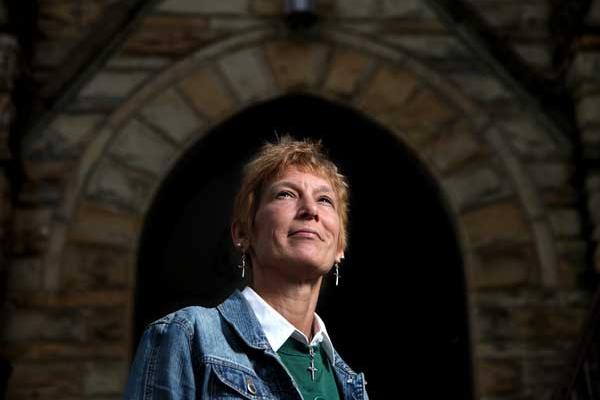CLEVELAND—When Bishop Richard Lennon began closing 50 Catholic churches in and around Cleveland three years ago, the bulk of the faithful quietly moved on.
Some drifted to other parishes. Some didn't go to church at all. Others elected to fight for their lost sanctuaries, taking up protest signs, joining prayer vigils, signing petitions and filing appeals to the Vatican.
Many who resisted the closings worked quietly, too timid to publicly confront ecclesiastical authority, which, since childhood, they had been taught to respect.
But Patricia Schulte-Singleton was not intimidated by a Roman collar, a bishop's edict or the raised eyebrows of the obedient.
When she got the word in May 2009 that her church, St. Patrick, was going to close in a merger with two other parishes, she said she went to the pastor, the Rev. Thomas Hagedorn, and told him, "We ain't taking this lying down."
Schulte-Singleton and scores of other St. Patrick parishioners quickly organized and raised $13,000 for a campaign that included mailings, T-shirts, billboards and the hiring of canon lawyers in Rome to represent them in their appeal.
Meanwhile, she and other protesters organized a group called Endangered Catholics, exhorting parishioners of closed churches to join a bigger fight.
Schulte-Singleton, who worked full time as a tax agent for the state of Ohio, helped collect 5,000 petition signatures, calling on Rome to appoint another bishop to oversee Lennon's closings.
She flew to Boston to learn how a group of parishioners there took over a closed church in defiance of the archdiocese. And she followed Lennon Sunday after Sunday as he closed churches, sometimes confronting him face-to-face after the final Masses.
"I'm not one to be shy," Schulte-Singleton, 53, said in a recent interview. "I do what I have to do. That's how I was raised."
Schulte-Singleton started attending St. Patrick parish in 1990. Initially, she was not involved in parish activities, but an accident -- one of her daughters lost two fingers from an exploding firecracker -- changed that.
Schulte-Singleton said she was surprised by the outpouring of support from parishioners who brought food to her home and baby-sat her two other kids while she and her husband attended to their daughter in a hospital.
"That really showed what St. Pat's was all about," she said. "The parish became part of my family. And then I became really involved with the parish."
In May 2010, six days before St. Patrick was to close, Schulte-Singleton, wired with a hidden tape recorder, had a meeting with Lennon.
The parish council president said it was her last-ditch effort to change the bishop's mind. "I was a little bit nervous," she said. "I looked into his eyes and tried to reason with him."
But the bishop's mind could not be changed. On Sunday, May 30, 2010, Lennon said the last Mass at St. Patrick and granted parishioners' request to pray a rosary before the place was locked up.
Schulte-Singleton said the bishop allowed her to be the one to lock up while the congregation exited through a side door.
"I locked the outside front doors and the ones inside the vestibule," she said. "I was crying, but I said to myself, 'We'll be back.'"
Schulte-Singleton, who lives a five-minute walk from St. Pat's, did not join another parish. She drifted from church to church for Sunday Mass and sometimes didn't go at all.
"Until Rome tells me I'm not a parishioner of St. Pat's," she said, "I'm a parishioner of St. Pat's."
Last month, Rome told her she was still a parishioner of St. Pat's when a Vatican tribunal issued decrees saying Lennon violated procedures and canon laws when he closed St. Patrick and 11 other churches that appealed.
"It's time for peace and unity in the Diocese of Cleveland," Lennon said after deciding not to appeal the ruling. Through a spokesman, he used the same words when asked to comment on Schulte-Singleton.
The bishop gave no timetable for reopening the churches, saying he needs to restaff them, return sacred artifacts that were removed for safekeeping and clean up the properties.
Schulte-Singleton said St. Patrick had about $36,000 in savings when it closed. It also owned nearby rental property, a pickup truck, furniture and a host of odds and ends, she said.
"We want everything back," she said. "The money, the truck, the furniture, even the rolls of toilet paper."
She said St. Patrick had 1,100 families on its books when it closed. "I think 75 percent will come back," she said. "And I'm hoping the parishioners will be more active in the parish. To keep a parish alive, you need to give of your time and talent."
Schulte-Singleton said that when Lennon came to Cleveland in 2006, he met with her and other parish council presidents. "He told us we had to be bold leaders in our parishes," she said. "Well, I'm doing what he told me to do. I'm being bold."
Michael O'Malley writes for The Plain Dealer in Cleveland. Via RNS.
Got something to say about what you're reading? We value your feedback!
